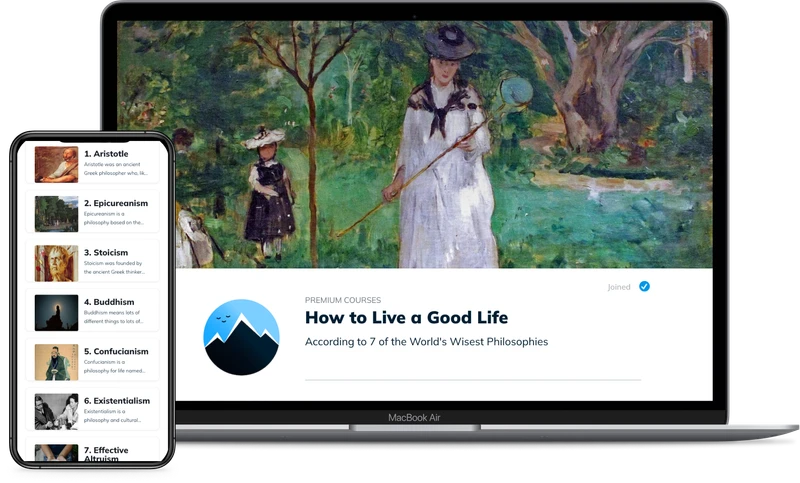
The ‘Golden Mean’: Aristotle’s Guide to Living Excellently
Aristotle’s ‘golden mean’ is his theory that excellence lies in the middle way between two extreme states: excess and deficiency. This article considers the theory — and shares Aristotle’s tips for living in accordance with it.

Aristotle’s ethics was centered around the pursuit of eudaimonia, meaning happiness or flourishing — and he believed we could achieve eudaimonia by using reason excellently in everything we do.
However, we might think: it’s all well and good to define happiness as ‘excellent rational activity’. But what does excellence really mean? How can we act excellently? How can we make good choices and deploy our rationality to live happy lives?
To answer these questions, Aristotle introduces his famous theory of the mean, which has popularly become known as his ‘golden mean’.

Aristotle’s golden mean: a guide for making decisions
Aristotle notes how people often appeal to ‘virtues’ when it comes to guiding their behavior: courage, honor, justice, prudence, generosity, and so on. (For instance, see our quick explainer on the four cardinal virtues of Stoicism).
Now, Aristotle is less interested in blindly following such traits, and more interested in establishing what makes them virtuous.
His answer is that the virtues are actually just examples of excellent rational activity: those who exhibit courage, honor, justice, and the like, Aristotle argues, are really just using reason well.
This connection between virtue and reason is made clear, Aristotle thinks, when we recognize that all ‘virtues’ lie in the middle way between two extreme states: excess and deficiency. For instance:
- Courage is the middle way between cowardice (deficiency) and recklessness (excess).
- Confidence is the middle way between self-deprecation (deficiency) and arrogance (excess).
- Generosity is the middle way between stinginess (deficiency) and profligacy (excess).
Virtue lies not in the exact middle, but at the so-called ‘golden mean’, which will sometimes be closer to one extreme than the other. As Aristotle puts it in his Nicomachean Ethics (his most studied work on ethics, which features in our list of Aristotle’s best books):
at the right times, about the right things, towards the right people, for the right end, and in the right way, is the intermediate and best condition, and this is proper to virtue.
Excellent action, then, is “concerned with choice, lying in a mean relative to us, this being determined by reason and in the way in which the man of practical wisdom would determine it.”
Importantly, identifying the golden mean between excess and deficiency is something we can get better at over time. As Will Durant puts it in his 1926 book, Story of Philosophy:
The golden mean… is not, like the mathematical mean, an exact average of two precisely calculable extremes; it fluctuates with the collateral circumstances of each situation, and discovers itself only to mature and flexible reason.
Excellence isn’t ingrained, but learnable
Excellence, then, is learnable. Indeed, if you are unable to play a certain instrument and never practice it, then you will never improve at it, and deserve a reputation for being bad at it. “The same then is true of the virtues,” Aristotle says:
It is by taking part in transactions with our fellow men that some of us become fair-minded and others iniquitous; by acting in dangerous situations and forming a habit of fear or of confidence we become courageous or cowardly.
Practical wisdom and the good action following it, then, are things you attain with practice. By stepping out into the world and habitually trying to do the right thing — by habitually trying to identify the mean between deficiency and excess in all you do — you can begin improving yourself today.

From the Buddha to Nietzsche: join 20,000+ subscribers enjoying my free Sunday Breakdown
In one concise email each Sunday, I break down a famous idea from philosophy. You get the distillation straight to your inbox.
💭 One short philosophical email each Sunday. Unsubscribe any time.
This is the rather nice thing about Aristotle: far from labeling particular traits or qualities of character as permanently good or bad, he recognizes the nuance that the real world demands.
Every situation is different, and so is every person. Sometimes being nice is the right course of action; sometimes it may be taken advantage of. Sometimes deploying humor is wise; sometimes it’s inappropriate. Sometimes anger is inexcusable; sometimes it’s the only valid response.
Living a full, flourishing life is not a matter of being born a good person, but of consistently using reason well to decide the appropriate course of action within the different contexts in which you find yourself.
As Edith Hall candidly puts it in her book, Aristotle’s Way:
I don’t think I’m exceptionally worthy or nice. I struggle with some unpleasant character traits. After reading Aristotle on virtues and vices, and talking honestly with people I trust, I believe my own worst faults are impatience, recklessness, excessive bluntness, emotional extremes and vindictiveness. But Aristotle’s idea of the ideal mean between extremes, which we call ‘the golden mean,’ explains that all these are fine in moderation — people who are never impatient don’t get things done; people who never take risks live limited lives; people who evade the truth and do not express pain or joy at all are psychologically and emotionally stunted or deprived; and people who have no desire whatsoever to get even with those who have damaged them are either deluding themselves or have too low an estimate of their own worth.
Even if you don’t like particular qualities about yourself, those qualities are probably highly valuable in certain contexts. The trick lies in knowing when and in what proportion to deploy the different behaviors of which we are capable. This is what ‘moderation’ means for Aristotle: not never showing strong feelings, but knowing when it is appropriate to do so.
Excellence, then, isn’t about what you think you ‘are’; it is what you do that matters.
How can we consistently find the ‘golden mean’ of right action?
Determining the right course of action in every situation is far from easy, Aristotle concedes. While we can decide to try to improve ourselves, we cannot decide to become perfect beings overnight. To illustrate this point, Aristotle considers the tricky subject of anger:
Anybody can become angry, that is easy; but to be angry with the right person, and to the right degree, and at the right time, for the right purpose, and in the right way, that is not within everybody’s power and is not easy.
What’s more, even if you do find what you think is the ‘golden mean’ of right behavior, there will be those who vehemently disagree with you.
Those on the extremes, for instance, may look at the middle position as a vice. As Aristotle writes, such people…
expel towards each other the man in the middle position; the brave man is called rash by the coward, and cowardly by the rash man, and in other cases accordingly.
This is especially common in politics, where someone who regards themselves as ‘central’ will likely be called radical by conservatives, and conservative by radicals.
Tips for identifying the ‘golden mean’
Thankfully, Aristotle does offer some guidance for how we might improve at discovering the ‘golden mean’ of right action, and for living well generally (including, for instance, why we should prioritize leisure over work, and how we can cultivate the 3 different levels of friendship).
For example, if we know we are typically at one extreme when it comes to a certain behavior, then…
we must drag ourselves away in the opposite direction, for by steering wide of our besetting error we shall make a middle course. This is the method adopted by carpenters to straighten warped timber.
In other words, if you recognize and dislike the fact that you are, say, quick to temper, you may view someone who never loses their temper as virtuous. Now, Aristotle would say, this isn’t necessarily true, for someone who never loses their temper risks deficiency in situations that call for it. But if thinking this way helps you modify your behavior to a more middle way between unnecessarily quick-tempered and overly placid, then by all means aim for placidity.
In one concise email each Sunday, I break down a famous idea from philosophy. You get the distillation straight to your inbox:
💭 One short philosophical email each Sunday. Unsubscribe any time.
Another point to consider is that, though the middle way is best, one of the extremes will typically be worse than the other in any given situation. For instance, Aristotle thinks it is better to be overly-generous than extremely stingy, and better to be self-deprecating than boastful.
So, Aristotle advises, a good principle “in aiming at the mean is to avoid that extreme which is the more opposed to the mean.” In other words: to be safe when calculating the right course of action in any given situation, lean into the ‘less bad’ side of the equation.
The next tip is to be ruthlessly honest with yourself and work out the undesirable behaviors to which you are personally most vulnerable, and factor those into your assessments of situations. (If you know you have a tendency towards being impatient and uncommunicative, ask yourself: ‘am I being impatient? Am I being uncommunicative? Do I need to compensate for these?’)
The final tip is to not be too hard on yourself: in Aristotle’s project for happiness, all mistakes are learning opportunities. As Hall puts it:
Even the best of us slip up and make mistakes. Regret or self-recrimination is not helpful. The important thing is to continue trying.
Learn more about Aristotle’s philosophy of life
What do you think of Aristotle’s golden mean? Do you find it an accurate characterization of virtue, and a useful guide for human behavior? Or do you find it too general to be of use?
Whatever your answers, you can learn more about Aristotle’s ethics and discuss your thoughts with others in our new course and community, How to Live a Good Life, which explores 7 of the world’s most influential philosophies for living — including Aristotelianism, Buddhism, and Existentialism.
Learn more and sign up here: How to Live a Good Life (According to 7 of the World’s Wisest Philosophies).

How to Live a Good Life (According to 7 of the World’s Wisest Philosophies)
Explore and compare the wisdom of Stoicism, Existentialism, Buddhism and beyond to forever enrich your personal philosophy.
Get Instant Access★★★★★ (100+ reviews for our courses)
About the Author

Get one mind-opening philosophical idea distilled to your inbox every Sunday (free)

From the Buddha to Nietzsche: join 20,000+ subscribers enjoying a nugget of profundity from the great philosophers every Sunday:
★★★★★ (100+ reviews for Philosophy Break). Unsubscribe any time.

Take Another Break
Each break takes only a few minutes to read, and is crafted to expand your mind and spark your philosophical curiosity.





